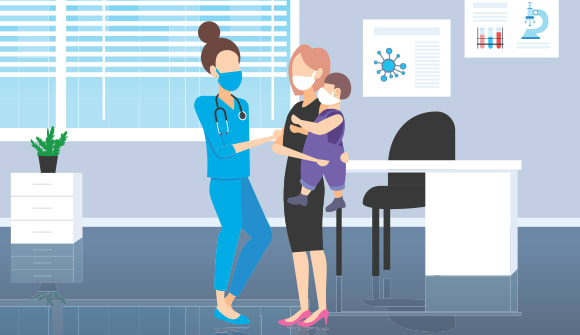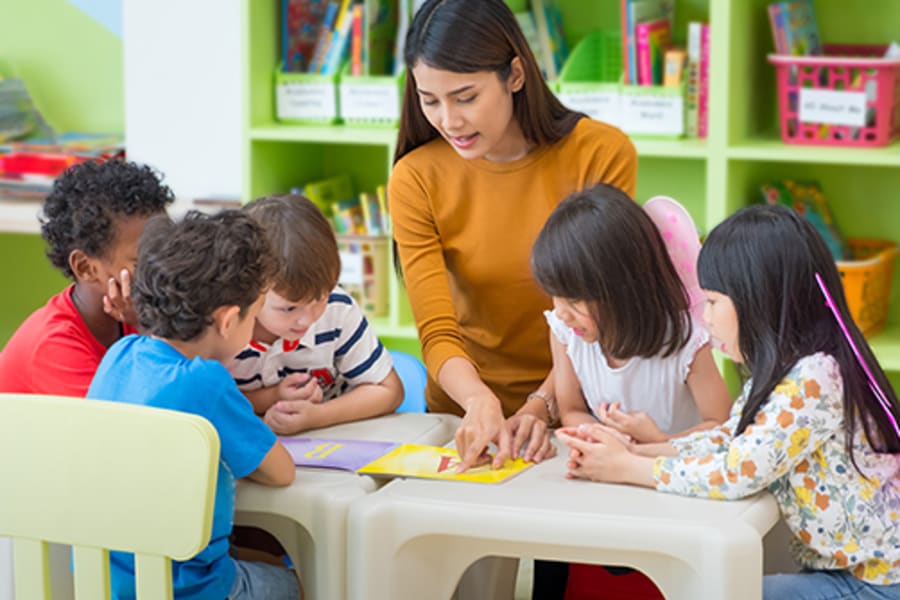Care to never put off
Why you should stick to your child's scheduled immunization schedule during COVID.
Article Author: Vikki Mioduszewski
Article Date:

Over the past few months, life as we knew it has changed dramatically. We are all socially distancing by staying home more, postponing hair appointments, graduations and family gatherings, and telecommuting to work. Masks in public are now the norm, as is staying at least six feet apart. The ultimate purpose of these efforts is to help to keep as many people as possible healthy during the coronavirus pandemic by limiting the spread of the COVID-19 virus from person to person.
One unfortunate result of social distancing is that routine well care, especially for young children, is being postponed. Well-child visits during the first two years of life help parents and pediatricians track the child's growth and neurologic development at an age when they can’t communicate with us. These visits are also an opportunity to vaccinate our youngest patients against certain bacteria and viruses that can make them extremely ill and even be fatal.
Immature immunity
When babies are born, they have no natural immunity. By vaccinating them according to the American Academy of Pediatrics (AAP) guidelines, we are able to protect them from diseases our ancestors feared, just as we currently fear COVID-19. The AAP recommends that well-child care should continue in person, especially during the first 24 months of life when we are vaccinating and building the child's immunity to easily transmitted diseases.
The risk of missing routine vaccines
If we continue postponing vaccination appointments, our country risks the resurgence of pertussis, influenza B, meningitis, polio and more. Recent measles outbreaks in New York and Minnesota have shown us what can happen when even small groups of unimmunized patients come in contact with each other. Herd immunity, which is what we are trying to obtain with COVID-19, will be lost for all of these other diseases if too many children miss their well-child visits.
In order to protect our most vulnerable patients, many primary care offices are restricting in-office visits to well-child visits only, requiring that masks be worn by patients, parents and staff, and allowing only one parent to attend the visit in person. Rooms are now cleaned following newer, stricter infection control practices and are left unused for a longer period of time between patients. Cars have become the new waiting rooms, and you will receive a phone call when it's your child's turn to be seen.
As a mother of three, I understand the fear every parent has — that they may be doing the wrong thing for their child by bringing them to the doctor right now for their vaccines. But as a pediatrician, my goal is to advocate for children and provide them with the best medical care based on scientific evidence. I encourage all parents to contact their primary care offices and ask what they recommend, including what COVID-19 safeguards they have implemented. Our ultimate goal as pediatricians (many of whom are parents, too) is to provide safe care for our smallest patients and protecting them from the coronavirus and vaccine-preventable diseases.
It's crucial for parents to "Get the facts" about childhood immunizations and vaccinations, which is why THE PLAYERS Center for Child Health at Wolfson Children's Hospital, the Northeast Florida Pediatric Society and the Partnership for Child Health have launched the VaxJaxKids campaign to educate the public and spread awareness. The website is a one-stop-shop with everything parents and caregivers need to know.
Our guest columnist is Bethany Atkins, MD, a board-certified pediatrician with Baptist Pediatrics and Wolfson Children's Hospital. She studied biomedical engineering before heading into medical school, and today she specializes in immunizations, well-child care, and preventive medicine. She is immediate past president of the Northeast Florida Pediatric Society and chair of the Partnership for Child Health and several other boards while also being a recent empty nester.



